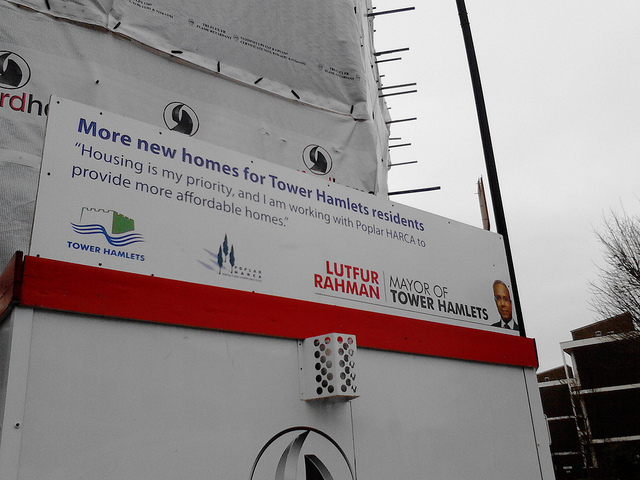The PwC report on Tower Hamlets highlights fundamental tensions in local democracy, not always thought through clearly in new mayoral systems
The Secretary of State for Communities and Local Government recently appointed commissioners to run the London Borough of Tower Hamlets, following the publication of a Government-commissioned PWC report which was damning about the failings of the current adminstration, led by Mayor Lutfur Rahman. Michael Keith, a former Leader of the Council, argues that the affair highlights some inherent tensions in local and municipal government, which the Mayoral structure is ill-equipped to deal with.

Credit: Gordon Joly, CC BY ND 2.0
Competent bureaucrats commonly believe they protect the public interest by delivering transparent decision making in public institutions. This is commendable. Politicians normally believe that they are elected to carry out the wishes of their voters. This is forgivable. But these imperatives rub against each other when politicians try reshaping things in an image they prefer and the bureaucrat wants to preserve an order they recognize. This is difficult.
This tension is not new. Recent events in the east end of London exemplify an old problem. Max Weber’s thoughtful and commonly misunderstood discussion identifies this tension as one of the diagnostic features of bureaucracy. The bureau is in and of itself without politics. In a vocabulary anachronistic in its use and counterintuitive in its usage it might even be argued that Weber suggested bureaucracy was fundamentally anti-political. The bureaucrat could serve the Chinese despot, the papal machine or the liberal democratic reforming state equally well. But at its best s/he personified a particular kind of stasis, a performative form of repetition without difference.
The bureau reproduces a specific social, moral and political order; dispassionately and without fear or favour or individual exception. This predictable repetition is at the heart of the bureau’s strengths. At its best it makes visible transparent process. But our conception of the ‘political’ is at heart about change, the juxtaposition of one moral order against another. The politician – whether or not democratically elected – is for Weber a personification of the will to advance a preferred moral order and social settlement. A ‘conservative’ appeals to a particular set of pre-existing values threatened by social change, an alternative politics actively promotes a new moral order against an old one. In cities of flux, characterized by high levels of demographic ‘churn’, migrant urbanisms and processes of regeneration and gentrification the social order is constantly on the move, generating particular challenges for the bureau.
Translated into local government, the most conscientious political actors become engaged in representative democracy for a reason. Councillors normally want to change things in the ward and the local authority they represent. They identify needs, community organisations they believe are doing good things unnoticed, campaigns they want to champion. Such interests sometimes can be advanced through the bureaucracy. But such interests at other times have to be championed against the bureaucracy. Domestic violence only becomes an ‘object’ of local governmental gaze when community organisations campaign for it to be recognized. The consequences of an ageing population with multiple challenges are only recognized by welfare departments after a lot of knocking on doors at city hall. And in multicultural settings both entrenched forms of systemic racial disadvantage and a politics of recognition of cultural difference depend on changing the local state to recognize properly the different needs of cultural groups and evolving and at times banal demographics.
In my own experience the mums’ clubs based in certain locations and the provision for the elderly that once appealed effectively to a past East End tradition of gathering, music and alcohol based conviviality worked accidentally to exclude those who did not gather in pubs, did not socialize around a cup of tea and a cigarette after dropping the children at school. So the bureau only recognizes and changes with pressure. Multicultural realities challenge and change the bureau, belatedly some times, proactively when politcians advance in good faith an understanding of the complexities of new social formations through the architecture of city hall. But such change is never without friction.
Such tensions can be constructive. But in British mayoral systems we are unsure what the proper checks and balances should be. In Tower Hamlets when the will of a people so diverse, so rich and poor, so much a mix of different cultures is personified by one man, the challenges are particularly acute. Price Waterhouse Coopers last week reported to Secretary of State Eric Pickles a situation that led the Secretary of State to suggest that the report “paints a deeply concerning picture of obfuscation, denial, secrecy, the breakdown of democratic scrutiny and accountability, and a culture of cronyism risking the corrupt spending of public funds.”.
The report highlighted that in Tower Hamlets the three most senior bureaucrats are all on temporary contracts. The boss (head of paid service), principal lawyer (monitoring officer) and head of finance (section 151 officer) are insecure. They depend on political whim for their pay cheque. The checks and balances for a mayor in one of the most socially polarized parts of Britain are diminished. As PWC suggest and illustrate by one example after another the result in today’s east end is potentially catastrophic. This is why we need to think carefully how checks and balances for elected mayors should work, in the east end and elsewhere.
On the BBC Radio 4 Today programme on 13th November (and in other media) reports on recent events in Tower Hamlets have focused on whether or not there has been criminal behavior reported by PWC. Former Mayor of London Ken Livingstone and former MP for Bethnal Green and Bow George Galloway, both supporting Mayor Lutfur Rahman, curiously mirrored the framing of BBC journalist Zoe Conway in focusing on the issue of criminality and fraud. But this is a chimera. If the report is judged by whether criminality or fraud is eventually proven, if the mayoralty is judged by convictions in court, misses the point. The true message of the PWC report and the lesson for putative mayoral innovations, in Tower Hamlets, in Manchester and elsewhere is that if the proper checks and balances on deliberative democracy are not in place then the result is dysfunctional, opaque and – most importantly – to the detriment of democracy and the disadvantage of local people.
It is why most people will welcome the potential role of three commissioners in east London that might mitigate the questionable deployment of democratically elected but executively absolute power in today’s Tower Hamlets.
—
This post represents the views of the author and not those of Democratic Audit or the LSE. Please read our comments policy before posting.
—
 Professor Michael Keith is the Director of COMPAS at the University of Oxford. He also has s a personal chair in the School of Anthropology at the University of Oxford. He is working on projects in the Labour Markets,Citizenship and Belonging, Urban Change and Settlement, and Welfare clusters. He was previously a politician in the East End of London, and has served as the Leader of Tower Hamlets Council.
Professor Michael Keith is the Director of COMPAS at the University of Oxford. He also has s a personal chair in the School of Anthropology at the University of Oxford. He is working on projects in the Labour Markets,Citizenship and Belonging, Urban Change and Settlement, and Welfare clusters. He was previously a politician in the East End of London, and has served as the Leader of Tower Hamlets Council.





 Democratic Audit's core funding is provided by the Joseph Rowntree Charitable Trust. Additional funding is provided by the London School of Economics.
Democratic Audit's core funding is provided by the Joseph Rowntree Charitable Trust. Additional funding is provided by the London School of Economics.
[…] is cross-post from Democratic Audit, a public policy group based at the London School of Economics. It was published two weeks ago and […]
New piece @democraticaudit on #towerhamlets from a former leader of the council: https://t.co/V8OnclUEdz
What does the Tower Hamlets imbroglio tell us about local government? https://t.co/oVjhKdI8JO
TH report ‘highlights fundamental tensions in local democracy, not always thought through in new mayoral systems’
https://t.co/zCq0T0A5Xx
Tower Hamlets highlights tensions in local democracy, not always thought through clearly in mayoral systems https://t.co/M457TzIa6J
The PwC report on Tower Hamlets highlights fundamental tensions in local democracy, says former TH Council leader https://t.co/EJuTMfkmw2
The PwC report on Tower Hamlets highlights fundamental tensions in local democracy, especially in new mayoral systems https://t.co/OqjM6ZYPEv
The PwC report on Tower Hamlets highlights fundamental tensions in local democracy, not always thought through c… https://t.co/ELe7xWDNjV
The PwC report on Tower Hamlets highlights fundamental tensions in local democracy, not always thought through… https://t.co/8Eq5SetiCb